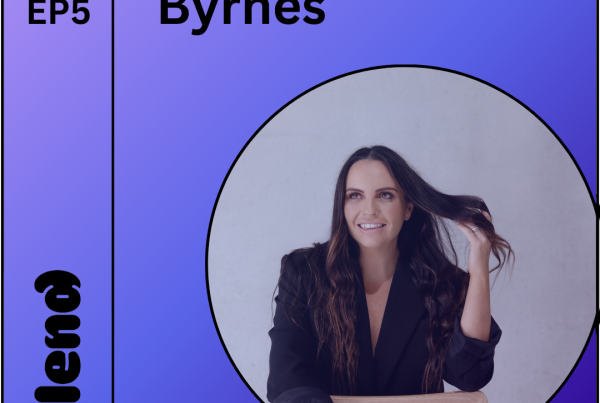
In this episode we talk all-things new partners with Stepfamilies Australia General Manager, Phoebe Wallish – including the important question of ‘when’ is the right time to introduce the kids to a new partner?
We’ll also explore the dynamics at play when it eventually might come time to move in, as well as ways to help you cope with your emotions if your ex-partner has met someone first.
• Stepfamily.org.au
• Stepfamily Australia Facebook Page
Phoebe Wallish (00:01): Step actually is like a German word for loss. So, there’s this whole grief and loss process with step and blended families.
Laura Jenkins (00:09): In The Blend is a podcast series that helps parents navigate life within a blended family. Join me as I speak with experts and guests to get practical advice on how to have a harmonious blended family life. This series dives deep into the unique dynamics, logistics, and challenges of raising a blended family. From new partners to juggling mixed finances, we will help guide you through it.
(00:38): Hello, and welcome to In The Blend. In today’s episode, we’re tackling all things new partners in blended family relationships and how to cope when a new partner comes along, either in your life or that of your co-parents. I know when I met Matt and he had two young children, it was a good few months into our relationship before I was introduced to them. We have another family friend who didn’t meet her partner’s children for over a year. There can also be new dynamics at play when your ex forms a relationship, and in particular if their new partner has children of their own. My guest today is here to provide some color when it comes to all of these topics, and is very well placed to do so, being the general manager of Step Families Australia. Phoebe Wallish is also the director of Durmmond Street Services and is passionate about wellbeing, equality, social justice, and a fair and equitable society for all.
(01:37): Welcome Phoebe, and thank you so much for joining me today. I’m very much looking forward to this conversation. I know that when is the right time to introduce the kids in particular is such a compelling topic, and I would love to start there today. Can you provide any guidance around when it might be the right time to bring the kids into the equation if you’re in a new relationship?
Phoebe Wallish (02:02): Oh, hi, Laura. Thanks for having me on In The Blend. It’s great. Yeah, it is a tricky one because it really depends on, I think, the age and the stage that your kids are at. So, with young kids, I guess, it’s not as bad. You can introduce a new parent quite early in the piece, if you like, or a new partner, sorry, quite early in the piece. I would go to a park or something like that. That’s a bit fun, bounce, something that you can do something with the child and just sort of start off as, “This is mom or dad’s friend.” It’s when the child gets a bit older that it gets a little bit more tricky because yeah, there’s factors like guilt of the other parent and a little bit of resentment maybe. Yeah, so I think you really need to be careful and there are some things that you can do to help that, but it really does depend on the age and the developmental stage of your child. And yeah, keep that into consideration.
Laura Jenkins (03:18): Got it. So, it’s one of those things where there’s no right or wrong.
Phoebe Wallish (03:22): No.
Laura Jenkins (03:22): And everyone’s going to have a slightly different situation. I know in my personal situation, my partner’s children were two and four when we met and it was a good few months until I met the kids. And I’ve got friends who haven’t met their new partner’s children for much longer than that and some who’ve met them straight away. So. I think as you say, it depends on the age and the individual circumstance. In terms of that first meeting, I know you mentioned a couple of places that might be good suggestions. Is there anything that you should do to prepare your kids in advance? And again, I think this probably depends on the age of the children, but can you offer any guidance there?
Phoebe Wallish (04:06):
Yeah, absolutely. I think if you’ve got a relationship at all with the other parent, it’s a good idea to talk to them about it first. So. Ring up, have the conversation, say, “Look, I’ve met somebody new. We’ve been together for this many months and I’d really like to introduce them to the kids.” And do that well in advance in case they want to have some time to sit with that and think about it and then bring up some questions that they might have around that. I think open communication with your kids is also the best. So, talk about relationships, talk about how having a relationship would make you happy. It’s a really great way also to talk about safe, healthy relationships, what they look like, conversation starters for your kids. And you’re going to need to do that all the way through. So, I think that’s something that you need to revisit.
(05:07): So, for example, if you meet someone and six months in you go, “Actually, this person’s really great, I’m really getting along with them. I can see a future with this person,” I think that’s then a really great window to talk to your kids about what relationships are, what they look like, how you want to go on and have another relationship and what that might look like, really open communication so that when you do come to that meeting, it’s not a surprise, it’s not a shock. They’re not going to say, “Oh no, this is outrageous. I never wanted you to have another partner ever again,” because there will be a loss. There will be a loss for the kids in that. We can be happy and in love when we meet a new partner, but for the kids, it’s a completely different scenario.
Laura Jenkins (06:00): Definitely. And then there’s extra complexities if your new partner has kids of their own.
Phoebe Wallish (06:06): Yes.
Laura Jenkins (06:07): So, what sort of additional challenges can that present on either side when a new partner has children? Is there anything further that they should be mindful of in terms of that initial introduction?
Phoebe Wallish (06:30): Yes. Yeah, absolutely. Because sometimes we go, “Oh kids, they’ll just get along. We’ll go and have a barbecue in the park and expect them to get along.” And of course, that’s not the case. I mean, it’s great when it happens, and it does happen, absolutely, but more often than not, it doesn’t happen. We have these expectations that aren’t really realistic when we throw multiple personalities with each other. So, I think it needs to be slow, and I think you need to be really patient with that. And I think almost, it’s better to have one on one small snippets of time than big mass amounts of time altogether. Sort of needs to be a separate process when there’s double of the kids.
Laura Jenkins (07:20): Double the kids.
Phoebe Wallish (07:21): Yeah, yeah.
Laura Jenkins (07:21): Especially if they’re different ages and stages as well, or even the same ages. There can be challenges either way.
Phoebe Wallish (07:32): Oh, absolutely. And teenagers come by far the worst. I laugh when I say that because teenagers are amazing in terms of what they bring and how passionate they can be, but at the same time, they have belief systems, et cetera, and they take a little bit longer to work with and a lot longer to warm around to possibly a new partner. So. You do need to have that patience, and you need to build up that those experiences and the connections that you have with them. Don’t expect them just to like you, for example, straight away, because that’s probably not going to happen. Just aim for a really flat level respect, and then go from there. Anything above respect is probably a bonus.
Laura Jenkins (08:21): Yeah, I like it. So, thinking about the initial meeting and all of the various scenarios there, if it gets to the stage after that where things are going well and it might come to the time to move in together, should this be a process that you involve the children in as well?
Phoebe Wallish (08:40): Yeah, absolutely. I think if you are thinking of moving in together, you need to start that early again. Again, you need to bring up the fact that somebody might be moving into the house. Kids, if we don’t answer their questions and we don’t talk about things, they’ll make up things in their own mind. And they have worries that probably you wouldn’t have even thought about. And sometimes, it’s the minutia, like where are my socks going to go if that person’s in my room and you are going to give them that drawer, or am I going to be kicked out of my room? And they’ll sometimes think the worst as well. So, really bringing them in from the very start in those conversations. Don’t treat it like a company merger. Really sit down and talk all about it, how it’s going to look and to every little piece, because I think anything you can alleviate, their concerns or answer their questions is going to be a way more positive experience when the move does happen.
Laura Jenkins (09:48): And I imagine when the move does happen, it would be more important than ever for the biological parent to be having dedicated time with their children as well to make sure they’re still getting that individual time that were perhaps previously getting before the new partner moved in as well.
Phoebe Wallish (10:07): Yeah, well, that’s true. Step actually is a German word for loss, so there’s this whole grief and loss process with step and blended families, and kids will feel guilty if they have a friendship with a new partner. They’ll feel guilty for their other parent. So, there’s this… Alleviating those concerns as well as really important. It’s like, I’m still going to have time for you. I’m still going to love you. This changes nothing. We’re still going to have this. The other thing I think is a really good tip of what not to do is that when somebody does come in and move into your house, is not to throw all the traditions and rituals that you’ve done together as a family out the window and start afresh. I really recommend not to do that.
(11:02): I think you need to keep those traditions. It’s really important for the kids. But if new kids and a new partner are coming into the house, how do we maybe create some new ones? So, keep the old ones, but also let’s create a few new ones to make them feel included and to start that process of building history and memories in that way with them as well. I think-
Laura Jenkins (11:24): I love that.
Phoebe Wallish (11:25): Yeah.
Laura Jenkins (11:26): So, an example of that could be a dinner time ritual where everyone goes around the table and says something great that happened to them today, or… Would that be an example?
Phoebe Wallish (11:36): Yes, absolutely. Yep. Or if you have pizza and a movie every birthday that you have, for example, don’t just throw that out and go, “What? Well, now for birthdays, we’re going to do this because they might do something different.” Join them together, blend them, and do both if you have to, or cherry pick the really good ones and sit down and talk about it with your kids. Which of these do we want to keep? Or, well, that wasn’t working so well anyway. Let’s not go around the table and talk about our highlights. Let’s instead tell us one thing we learnt today or something.
Laura Jenkins (12:09): Yes.
Phoebe Wallish (12:09): And change it in that way. Yeah.
Laura Jenkins (12:11): I love that. Something else that I think about when it comes to this subject is the idea of balance and keeping the balance intact with all of your relationships when a new partner comes along. So, if you personally meet someone new, especially in those early stages, it can be all consuming, but at the same time there’s a few other stakeholders you’ve got to keep. You’ve got to keep those relationships going with your ex-partner for the sake of the children, and then of course the children. So, have you got any suggestions, Phoebe, for how you could go about keeping the balance intact with all of those different relationships that you need to keep going when a new partner comes into the scene and is taking up a lot of your focus and attention?
Phoebe Wallish (13:01): Yeah, I think rely heavily on some sort of schedule or routine. If you’re lucky enough and the kids are a bit older and you have a 50/50 arrangement, I think sometimes that can be easier because there’s a week there that you can say to your new partner, “This is our week.” And also, I would highly recommend taking time out for yourself as well in that process. Self care is huge in those first, I would even say a couple of years, for yourself, making sure that you are nurturing yourself, because it can be quite demanding with the children, but also making sure you keep those one on one times. If you’ve always read your son a book before you go to bed, continue to do that.
(13:48): If new kids are coming into the picture, picking something that’s relevant to their age and stage and something that they really like and sitting down and doing that with them. If it’s puzzles, just 10 minutes every couple of days is going to really help your relationship. These relationships take, the research that says at least five years to form, because you need to have experiences to build up a relationship. So, putting that time in is really important, but having that time out is equally important for your own mental health. And you really do need that because it can be quite tricky, especially with adolescents. I would probably say don’t even move in together if you’ve got adolescents, [inaudible 00:14:33] far apart as you can. I’m just kidding, but-
Laura Jenkins (14:35): Oh, gosh.
Phoebe Wallish (14:38): In some instances I would suggest that because sometimes it’s not worth it.
Laura Jenkins (14:45): Definitely. Definitely. And I think as well, coming back to what you were just saying, it can be really challenging to stay present in the moment as well-
Phoebe Wallish (14:56): Yes.
Laura Jenkins (14:56): … when you’re in a busy blended family household, and you’ve got a partner that wants a piece of you or an ex parent, partner texting you and needing something, and then a child and stepchildren needing your attention. So, that’s something that I personally have been trying to work on over the last couple of years, is really honing my skills at being present in the moment when I’m spending that time with the child, or when I’m having that self care time, I’m really there and I’m in the moment at the time.
Phoebe Wallish (15:32): Yeah, I think we all struggle that with that, and I think COVID’s made us be more present online than anything anywhere. And I think having rules around maybe a phone in the basket for two hours every day, or maybe I do this because I need to be present in that moment, like bath time is my time and it’s when I’m sitting there and we talk about the day, or dinner time or… Yes, definitely have a time that you can all connect and be present because I think that’s an issue absolutely anywhere. It’s not just step and blended families. I think being present and being with your kids is really important. And I think that also sense partners do have to wait. An ex-partner might have to wait until you finish that time with the kids. Your current new partner might have to wait until the week off or et cetera. And yeah, getting that balance, it is tricky. Yeah.
Laura Jenkins (16:38): Something that I was just thinking about, coming back to an earlier point you made around giving your partner or your ex-partner a phone call before you tell the kids just to let them know first, which I think is good advice, because likely the kids will tell them anyway.
Phoebe Wallish (16:54): Yes.
Laura Jenkins (16:55): Is there an opportunity when you would suggest your ex-partner meet your new partner?
Phoebe Wallish (17:03): Yeah, it depends the type of relationship that you have. If you’ve called up your ex-partner and said, “Look, I’m in a new relationship and they want to meet them,” and you have that sort of relationship, I would definitely do that before meeting the children.
Laura Jenkins (17:21): Okay.
Phoebe Wallish (17:23): If you have a… I know a brilliant blended family that have them over for barbecues every fortnight, and they talk and they share things and they go to schools together. And I mean, wouldn’t that be perfect if it worked like that all the time? But it doesn’t. Most of the time a relationship breaks down, there is contempt there, and there is anger and there is bitterness. But just to have a civil conversation or that type of relationship is best. It’s best for the kids. The research shows that it’s not how we deal with the kids, it’s that leftover contempt we have for our ex-partner that actually has an impact on the children. So, if you can deal with that part and just keep it civil, let them know what you’re doing. Give them a heads up on holidays. Give them a heads up that this new partners in my life, or I did have a partner and we’re actually not going to work anymore. I’m going to go back to being single. Either way, just give them that heads up, because yes, you’re right, the kids will tell them.
Laura Jenkins (18:36): Yeah.
Phoebe Wallish (18:37): And it’s better that they find out… I think it’s better that they find out from you.
Laura Jenkins (18:40): Firsthand, for sure. Something else I’m curious to ask you, Phoebe, is when your ex-partner meets someone new, some ways that you can go about dealing with your emotions. You might be jealous if they’ve met someone and you haven’t and they’re moving on and they’re happy again. They might be having a baby in a new relationship. What are some strategies for dealing with some of those emotions that might come up as well in that situation?
Phoebe Wallish (19:06): Yeah, I think that can be… Who knows how you’re going to react to when someone says, “Oh, they’re having a baby.” It’s like, I thought I was doing okay, but now I’m not doing okay. Definitely, I’m a huge advocate for counseling when things and transitions happen in your life. And it’s not like you need ongoing psychotherapy. Just one or two sessions sometimes really helps talking it out to an impartial person, and hearing yourself say it can be really beneficial. But likewise, chatting with a friend, arming yourself with your supports around you is also really important, and resources. We’ve got heaps of tip sheets and tools on our website. People who have written books about it, really funny books as well. Try and be positive in how you’re dealing with it. So, don’t just sit there and sort of dwell in those emotions of ruminate. Get out there and really work with it. Work with a counsellor, work with a friend, have cups of tea, do whatever you need to do with your self care strategies to get through it. But yeah, talking about it really helps.
Laura Jenkins (20:29): Very good advice. So, what role does Step Families Australia play? You touched on the tip sheets, and I’ve looked at some of those myself, which I found immensely helpful, but tell me more about the role that you play at Step Families Australia.
Phoebe Wallish (20:43): I wish we played a bigger role. I really do. It’s unfunded at the moment, and part of my job is to try and source some funding. So, at the moment, we have an online presence and we have plenty of tip sheets, as you’ve just mentioned, on the website. We also try and connect with counsellors who have expertise in step and blended families from around Australia. We try and go into organisations, like Relationships Australia, Life Works, et cetera, and give them a little bit more information around how step families are different to your traditional nuclear families, because step families are on the rise, single parenting households are on the rise. It’s not going to go away. It’s only going to get bigger. We know that in America, step and blended families are now over 50% of wow of all families. Roughly, we follow America in trends like that.
(21:46): So, it’s not far away where if you see that 50% of marriages break down and people do go on and re-partner… And not just when you have young kids. It could be later on. You could become a step or blended family in your 70s and have to navigate a Christmas with people you don’t know. So, there’s a whole range of things on our website. We have private Facebook chats and support groups, and we do do a Couch Chats, which is an online two session program that help parents sit with other parents as well and the same issues, but also give you a little bit of more tips and tools around how to deal with certain issues. So, yeah.
Laura Jenkins (22:34): Fantastic.
Phoebe Wallish (22:34): So, you can find all of that on our website, which is really… Yeah.
Laura Jenkins (22:38): Fantastic. Are they virtual sessions? The Couch sessions, are they-
Phoebe Wallish (22:41): Yeah, you can do them from anywhere, which is-
Laura Jenkins (22:45): Fantastic.
Phoebe Wallish (22:46): Yeah.
Laura Jenkins (22:47): So helpful. I know you’ve also got a link to lots of different counsellors and specialists who can help, as well-
Phoebe Wallish (22:54): Yeah, absolutely. And I think also, the other piece of the puzzle that we try and do is advocate, advocate for step families. People don’t use that term very often anymore because our fairy tales haven’t done us justice, but just advocate at any type of level we can. Get on radio, talk about them, make it mainstream because we need to do that.
Laura Jenkins (23:25): Absolutely. Phoebe, we’re almost at time here. Are there any other final tips that you might have for blended families when it comes to new partners?
Phoebe Wallish (23:36): Yeah, so keep your… Again, aim for respect all around and keep your expectations real. Yeah. So, I think having a new relationship’s, really exciting and wonderful for you, but not for your kids, and really remembering that and having open communication, chatting with your kids about all the necessary bits that they need to know about whatever age and stage. And they’ll be wild and wonderful questions and it’ll be great, but really talk to them and know that it can take up to five years for your kids to accept someone new. So, yeah. But don’t let it stop you because happiness and relationships are awesome.
Laura Jenkins (24:23): That’s it. Life’s got to go on.
Phoebe Wallish (24:25): That’s so true.
Laura Jenkins (24:29): Fantastic. Phoebe, thank you so much. I have really enjoyed our chat today.
Phoebe Wallish (24:32): Oh, so have I. Thanks, Laura.
Laura Jenkins (24:35): And just lastly, where can listeners go to connect with you or find out more about the work that Step Families Australia are doing?
Phoebe Wallish (24:43): Yeah, so you can go to stepfamily.org.au, or you can reach out and DM mr via the Step Family Australia Facebook page.
Laura Jenkins (24:54): Beautiful. Thanks, Phoebe. Bye now.
Phoebe Wallish (24:57): Bye, Laura.
Laura Jenkins (24:58): Thanks for listening to In The Blend podcast. The show notes for this episode are available at intheblend.com.au. And if you like what you heard, be sure to subscribe and please rate and review in your podcasting app. You can also follow me on Facebook, Instagram, and LinkedIn.





